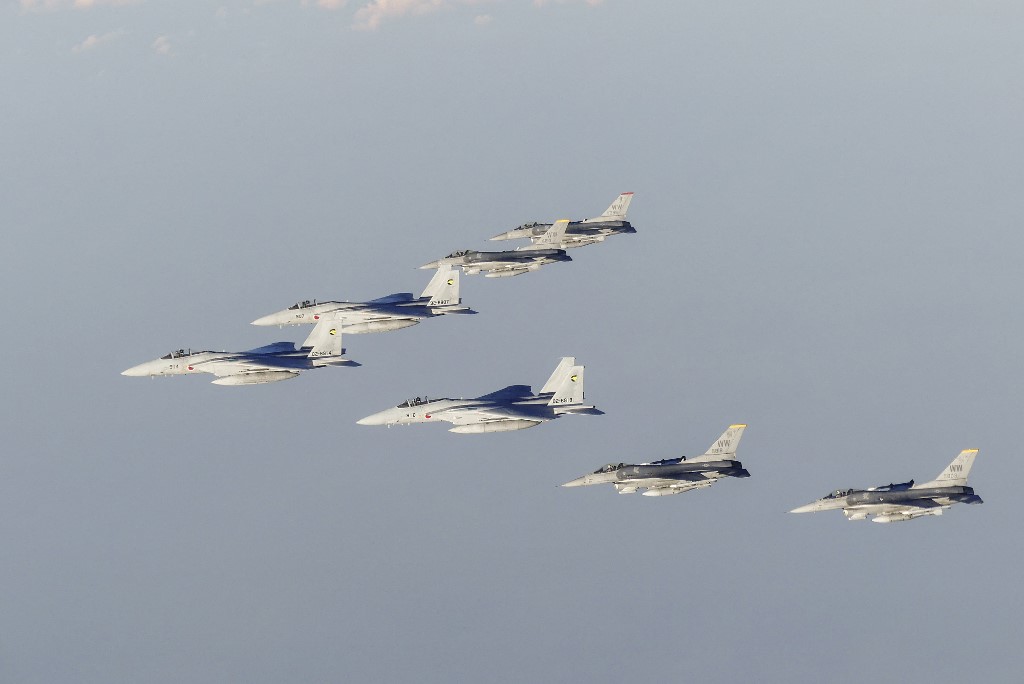
by Shaun TANDON
Agence France-Presse
WASHINGTON, United States (AFP) — The United States said Wednesday that attacks in space would invoke its defense treaty with Japan and announced the deployment of a more agile Marine unit on its ally’s soil as alarm grows over China.
Weeks after unveiling plans to ramp up security spending, Japan sent its defense and foreign ministers to Washington where the two countries issued a statement vowing to “modernize the alliance in order to address the increasingly severe security environment.”
The talks come two days before a visit by Prime Minister Fumio Kishida, who is touring Group of Seven nations to kick off Japan’s leadership year of the elite club and earlier Wednesday in London also boosted defense ties with Britain.
As China makes rapid advances in satellites, the United States and Japan warned in their statement that “attacks to, from or within space present a clear challenge to the security of the alliance” that could invoke Article Five of their mutual defense treaty, which considers an attack on one an attack on both.
The talks finalized a plan by the United States to send a so-called Marine Littoral Regiment, a more agile unit that can operate defenses both by sea and air, to Okinawa, the southern Japanese island strategically close to Taiwan.
US Defense Secretary Lloyd Austin said the unit would be in place by 2025 from a reorganization of an existing artillery regiment.
“I think this is going to contribute in a major way in our effort to help defend Japan and also promote a free and open Indo-Pacific,” Austin said, using the US turn of phrase for an Asia without Chinese dominance.
He reiterated the US commitment to defend Japan including over islets, known as the Senkaku by Tokyo and the Diaoyu by Beijing, contested by China.
– Taiwan risks but no ‘imminent’ invasion –
Japan has been officially pacifist since its defeat in World War II but has increasingly shed past sensitivities as China under President Xi Jinping exerts itself and as North Korea keeps firing missiles, some of them over Japanese territory.
China claims Taiwan, a self-governing democracy with strong links to Japan, and in August carried out major exercises after a defiant visit to Taipei by Nancy Pelosi, then speaker of the US House of Representatives.
The United States and Japan condemned China’s “dangerous and provocative” military activities and called for “peace and stability” in the Taiwan Strait.
Austin, however, played down fears that China is planning an imminent invasion.
“I won’t second-guess Mr. Xi but what I will tell you, what we are seeing recently is some very provocative behavior on the part of China’s forces,” Austin said.
“We believe that they endeavor to establish a new normal but whether or not that means that an invasion is imminent, I seriously doubt that,” he said.
A war simulation recently released by the Center for Strategic and International Studies, a Washington think tank, found that Beijing would hit Japanese bases, causing major damage, in an invasion of Taiwan but would most likely fail in its end goal.
– Addressing local concerns –
Okinawa, under US control until 1972, remains home to more than half of the 50,000 US troops in Japan and many have long seethed with resentment at the burden of the bases including the noise and occasional crimes by US troops.
Japanese Defense Minister Yasukazu Hamada promised to “continue to work on the reduction of the impact on Okinawa” and speak to local communities.
Kishida’s government said last month that Japan would increase defense spending by 2027 to two percent of GDP — in line with a separate goal by NATO nations, whose security concerns have also spiked due to the Russian invasion of Ukraine.
The United States praised the spending boost as well as Japan’s decision to build a “counterstrike capacity” — being able to hit launch sites that threaten the country.
The talks with Japan come ahead of a rare visit to Beijing by Secretary of State Antony Blinken, who said President Joe Biden was committed to “guardrails” on tensions.
“We’re not looking for conflict. We’ll manage the competition responsibly,” Blinken said.
© Agence France-Presse







